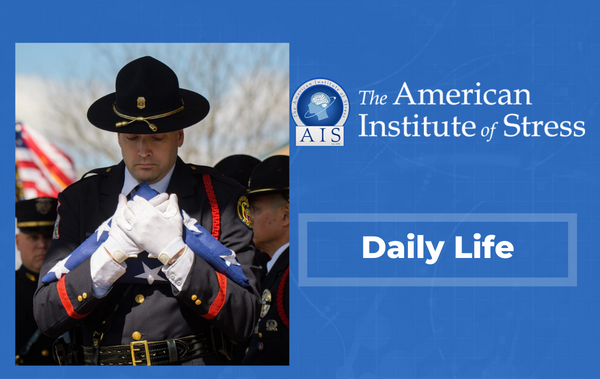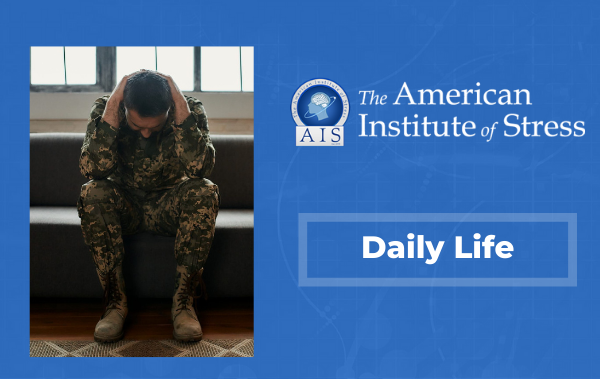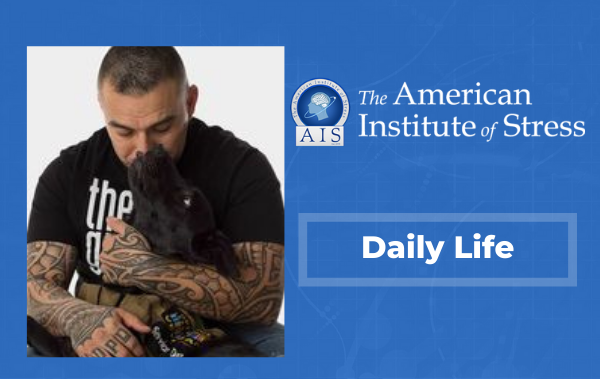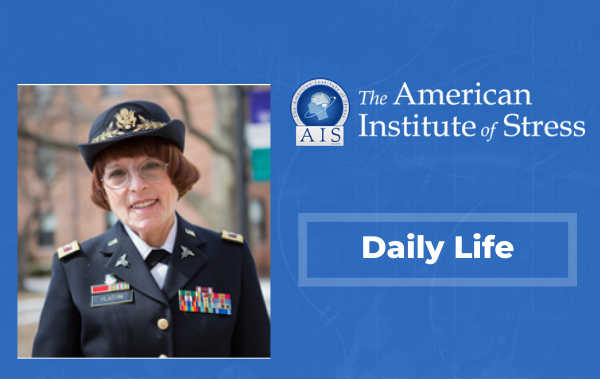 During their time serving our country, military personnel can encounter many kinds of traumatic events. Millions of veterans will carry that trauma with them, resulting in a condition known as post-traumatic stress disorder, or PTSD.
During their time serving our country, military personnel can encounter many kinds of traumatic events. Millions of veterans will carry that trauma with them, resulting in a condition known as post-traumatic stress disorder, or PTSD.
“Post-traumatic stress disorder is a mental health condition that’s triggered by a terrifying event — either experiencing it or witnessing it,” according to the Mayo Clinic. “Symptoms may include flashbacks, nightmares and severe anxiety, as well as uncontrollable thoughts about the event.”
PTSD in veterans is a serious issue, but many former service members and their loved ones do not know how to identify the condition or seek treatment. Because PTSD affects mental health and can be hidden, it can be difficult for health practitioners and other individuals to gauge its severity. Additionally, PTSD in veterans is often misunderstood by the public to be a condition that only affects combat veterans or those who have encountered violence firsthand. And even those who understand PTSD in veterans and its potential long-lasting harms still may not know all of its wide-ranging symptoms.
Included here are tips, tools, and resources that can help friends and families of veterans who may be suffering from PTSD. Ideas range from offering assistance to veterans after they have returned home from service, encouraging former service members to seek mental health treatment and simply having friendly conversations with veterans to see how they’re feeling.
Help a veteran to seek mental health treatment
One of the first and most difficult tasks in treating a veteran with PTSD is getting the veteran to acknowledge there is a mental health condition in the first place. One way to help these veterans is by encouraging them to seek counseling or treatment.
According to a fact sheet from the Rand Corporation, veterans and active military personnel are often reluctant to seek care for mental health concerns. Potential reasons for veterans’ reluctance to pursue mental health treatment include the perception that it is a sign of weakness, fear of potential career repercussions for seeking treatment and skepticism about the effectiveness of such treatments.
This is where families and friends can help. Addressing these concerns and encouraging a veteran to seek help for PTSD can prove immensely beneficial to all parties involved.
Educate others and raise awareness about PTSD
A major roadblock to the treatment and rehabilitation of veterans with PTSD is a lack of understanding regarding the disorder itself. Families and friends of veterans can help their loved ones by educating them, clarifying what PTSD is and what the possible symptoms are.
PTSD does not only afflict veterans who have faced combat or military action during their time in service. It can be the result of any trauma experienced by the veteran, regardless of whether it had a violent component or not. Veterans may struggle with trauma incurred during their time in the military for several months or even years after they’ve completed their service.
“In some cases, people experience chronic trauma that continues or repeats for months or years at a time. The current PTSD diagnosis often does not fully capture the severe psychological harm that occurs with prolonged, repeated trauma,” according to an article from the VA’s National Center for PTSD. “People who experience chronic trauma often report additional symptoms alongside formal PTSD symptoms, such as changes in their self-concept and the way they adapt to stressful events.”
Additionally, PTSD is a condition that exists on a spectrum, where one veteran may experience symptoms and levels of severity that are different from another veteran. Some veterans with PTSD might require hospitalization, medications or extensive treatment to address their symptoms, while others may need therapy or counseling sessions. PTSD can also be caused by indirect exposure to trauma, according to the American Psychiatric Association. For veterans, this could include experiencing trauma after the injury or death of a fellow soldier in combat.
Knowing about the wide-ranging effects, causes and symptoms of PTSD can enable friends and family of veterans to clear up misconceptions regarding the condition. This can lead to more support and wider public acceptance for veterans with PTSD. Families, friends and veterans themselves can also learn more about PTSD and mental health by participating in classes offered by the Homefront program from the National Alliance on Mental Illness, or NAMI.
Encourage veterans to join a support group
Even with a larger understanding of PTSD and how it impacts veterans, it may be difficult communicating with former service members about their mental health. Support groups can help veterans by providing them with a community of colleagues who have had similar experiences.
“A health-related support group may fill a gap between medical treatment and the need for emotional support. A person’s relationship with a doctor or other medical personnel may not provide adequate emotional support, and a person’s family and friends may not understand the impact of a disease or treatment,” according to an article from the Mayo Clinic. “A support group among people with shared experiences may function as a bridge between medical and emotional needs.”
The U.S. Department of Veterans Affairs, or VA, provides a helpful resource on how to start a support group for veterans. There may be additional support groups available from veteran, religious, nonprofit and health organizations in the veteran’s community. The Office of Disease Prevention and Health Promotion offers directories and resources to help access support groups for certain health afflictions. Additionally, veterans can also join digital communities on platforms including Facebook, where they can share experiences with other veterans across the world who may be suffering from similar illnesses.
Help a veteran become adjusted in their new home
One of the most difficult parts of transitioning from military to civilian life is creating a home life. Veterans are accustomed to following strict schedules and procedures and living where they are assigned during their time in the military. Friends and family can help veterans who have PTSD by encouraging and assisting them as they face decisions about how and where they want to live. This could include helping veteran scout apartments or a house after they leave the service; finding furniture, appliances and other items needed for the home; helping set up utilities and other necessary accounts; and visiting periodically.
Lifeline for Vets provides a list of resources that can help veterans and their loved ones throughout the transition to civilian life, including finding eligibility for a home loan and how to receive education or pension benefits.
Seek help and treatment from the VA and other military resources
While friends and family can be helpful to veterans with PTSD, there are more advanced services and treatment options offered by the VA and other military organizations to help former service members facing this condition.
The VA offers extensive inpatient and outpatient treatment services across the U.S. These services can range from initial evaluations of potential PTSD and suggested treatment options to specialized health services, including substance abuse treatment, anger management treatment and programs for female veterans. The VA also offers various forms of therapy to veterans, including family therapy, in which friends and loved ones can participate. On the organization’s website, the VA offers both a directory and a map that shows where PTSD resources are available by state.
There are additional resources like Outward Bound, an organization that provides wilderness courses and programs to build leadership and confidence among participants, which offers a specialized program for veterans. The Mission Continues is another organization that provides veterans leadership and advocacy opportunities in their local communities, helping give former service members a sense of purpose and aiding them in the transition to civilian life.
Find healthy ways to socialize and collaborate with veterans
There are many ways that friends and family can help veterans suffering from PTSD heal by socializing and collaborating with them.
“When moving to a new base or post, the military helps military personnel and families adjust. This structure is often not automatically in place when someone separates from the military. The veteran and their family may have to find new ways to join or create a social community,” according to a help sheet from the VA’s Mental Health Services department.
As veterans adjust to civilian life, friends and family can help by finding and participating in activities with their loved one. This can include helping veterans in their pursuit of a new hobby or activity or introducing veterans to new social or peer groups.
PTSD is a challenging disorder that can impair the quality of life for many veterans. But with these tools and resources, both veterans and their loved ones can find ways to address PTSD and help former service members live healthy and fulfilling lives.
Sources
American Psychiatric Association, “What Is Posttraumatic Stress Disorder?”
Mayo Clinic, “Post-Traumatic Stress Disorder (PTSD)”
Mayo Clinic, “Stress Management”
National Alliance on Mental Illness, “NAMI Homefront”
Office of Disease Prevention and Health Promotion, “Support Groups”
Outward Bound, “Reenergizing Veterans Through Adventure and Challenge”
Rand Corporation, “Improving Mental Health Care for Returning Veterans” U.S. Department of Veterans Affairs,
“Complex PTSD” U.S. Department of Veterans Affairs, “How to Start and Facilitate Support Groups for Veterans”
U.S. Department of Veterans Affairs, “Mental Health Services” U.S. Department of Veterans Affairs, “PTSD
U.S. Department of Veterans Affairs, “PTSD Program: Illinois”
U.S. Department of Veterans Affairs, “PTSD Treatment”
Original Article: HERE





